Mediamax’s exclusive interview with the Prime Minister of Armenia Karen Karapetyan
- Mr Prime Minister, you announced selection of 341 “realistic” investment projects in early February, with total cost of USD 3.2bn. You mentioned that you believe it is possible to realize projects to the value of USD 830-850m this year. If investments of that amount are implemented, will that bring visible changes concerning activation of economy?
- Of course, realization of those investments will lead to changes in the economy.
But I already noted that I consider 2017 a year of diagnosis, inventory, “sanitarization”, and increase of the governance system’s efficiency. Obviously, I don’t mean that the government doesn’t target economy growth. However, if we manage to digitalize our goals, get rid of excessive and inefficient structures, modernize the state decision-making system and make it more logical this year, then we will create a significant base for ensuring sustainable economic growth every year.
Apart from the mentioned 341, we have 79 more projects to the value of USD 5.3bn on our desks. Of course, we don’t have investors capable to provide such a volume yet, and not all projects have full data, but we consider this package to be the base for future works and attraction of new investments.
We also intend to destroy the idea that it’s impossible to invest in Armenia and create added value here. We gave a detailed presentation of the USD 3.2bn investments, and everybody can get acquinted with it and decide on the feasibility of the projects.
We should also take into account that the upcoming elections are a deterrent to activation of economy. Being the most pragmatic sector of the society, business people want to see the results of the elections before take any action.
- During the meetings in marzes, you said you wanted to stir up local business people, marz and community authorities. Did you succeed?
- There is some movement, but not to the necessary extent. In cooperation with our foreing partners, we provided the community and marz authorities with methodology for forming 5-year strategic development plans. That work is extremely important, even if the first draft plans are far from perfect.
Comparison of marz indicators is a huge source of information. We can see that the indicators of marzes with reference population and economy may substantially differ. That means there are problems we need to solve immediately. We follow the year-by-year dynamics of indicators through digitalization and get the objective data, which can serve as a base for estimation of the efforts realized by the heads of marzes and communities.
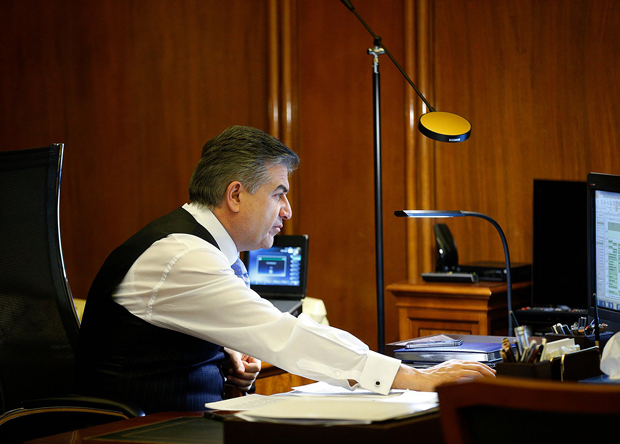 Karen Karapetyan
Karen KarapetyanPhoto: Tigran Mehrabyan
Unfortunately, we often spend state or community budgets inefficiently, without a clear understanding of the purpose of those funds.
Recently we launched a process aiming to develop methodology for the communities. Today we can see big differences between two communities with reference population concerning the budget and staff. We still have a lot of unification of this kind to do. Unfortunately, we often spend state or community budgets inefficiently, without a clear understanding of the purpose of those funds.
Let me bring another example. In marzes people often point to agricultural lands and say that the problem of irrigation isn’t solved yet for the given part. However, when we compare that data with that from the water resources agencies, we notice high inconsistency. We need to check everything to have clear image of what have now and what we want to achieve.
- You frequently stated that the main role of the state is to create fair conditions for the business and liberalize procedures as much as possible. When you meet business people, do you feel they are ready to become a real partner in activating Armenia’s economy?
- There are signs of it, but I cannot say they are satisfactory. I think in some measure it has to do with the upcoming elections. There is another factor as well: people want to see how consistent our team will be.
- What do you think about people who say “Whatever, they will not succeed anyway”?
- What could I think about them? I suggest they watch our work. Perhaps, with time they will change their opinion.
- For many years now our country’s been discussing the idea that Armenia cannot have growing economy as long as the Nagorno-Karabakh conflict remains unsolved. Opponents of that idea bring Israel as the example of the country also surrounded by unfriendly states that managed to create strong economy. Do you think Israel’s example is comparable to Armenia’s?
- Yes, it definitely is. Obviously, if we didn’t have the problems we face in our region, development of our economy would have been smoother. The example of Israel is a really good one and in a way I want us to make certain conclusions and accept that problems aren’t always obstacles.
Burdened with foreign, geopolitical, transport and other kinds of problems, we often find ourselves unable to square our shoulders, stand proudly and cast a more positive and ambitious look towards the future. If we establish smart management, we’ll be able to achieve substantial changes in key sectors.
I am certain that with time Armenia will boast the agriculture that people from many countries will come to see. And not only agriculture.
Burdened with foreign, geopolitical, transport and other kinds of problems, we often find ourselves unable to square our shoulders, stand proudly and cast a more positive and ambitious look towards the future.
For a long time we based the progress of our agriculture on the conviction that our country people are definitely good agriculturists. Coming from that idea, we provided them with subsidies, fertilizers, seeds, fuel and other means regardless of efficiency or other indicators of the farm, believing they knew what to do with all that. Reality proved that this model is not always effective.
Moreover, marzes don’t have established priorities of agricultural production, so the efficiency can change drastically if we utilize land and agricultural assets more purposefully. Moreover, it can change not only in agriculture sector.
For many years we’ve been talking the problems of our education system. The state and international organizations undertook multiple researches, then estimated the situation and pointed possible solutions based on the results. However, the fact is that the majority of our graduates don’t comply with requirements of local and global markets.
I am convinced that we’ll achieve success if we apply smart, modern and logical approaches, define clear goals and ways of achieving them in all sectors of our economy.
- You often stress the importance of educated and cultured people. Does that mean we’ve reached the point where absence of such people is noticeable in daily work?
- That problem is relevant not only for Armenia. Today the whole world is competing for the best people, and it’s clear that the number of such people will always be insufficient. New York, Shanghai and London suffer from lack of good specialists and managers. Another point is that the issue of good managers is particularly acute in our country. When we speak about modernization of the state governance system, we should keep in mind that salaries the state can offer today is not competent for attracting good managers from the private sector.
- Going back to education, I have noticed that Minister of Education openly speaks of current problems. In particular, Levon Mkrtchyan actually admitted that high schools aren’t successful in our country, and textbooks are in need of “key changes”, etc.
- Of course it’s great when Ministers discuss the issues. But I would like to emphasize an important point: I don’t want his words to be taken as criticism towards his predecessor. This Minister will be followed by another, who will also talk about the problems. There won’t be a time when we have no problems. We need to end the perception that discussion of problems means finding fault in the work of those before us.
- Several days ago you paid a visit to Yerevan State University, where you were once a student and then a teacher. You advised the students to be “rebellious”. How did they take it?
- Before answering your question, I’d like to state that the priority issue today is to ensure feedback between the government and the citizens. This applies to various sectors: business activitity, the fight against corruption, etc. For instance, we are all against corruption, but when it comes to a personal situation, we try to “solve the problem on the spot” with the road police officer instead of paying the fine, or we try to make a deal with the tax inspector instead of working within the legal field.
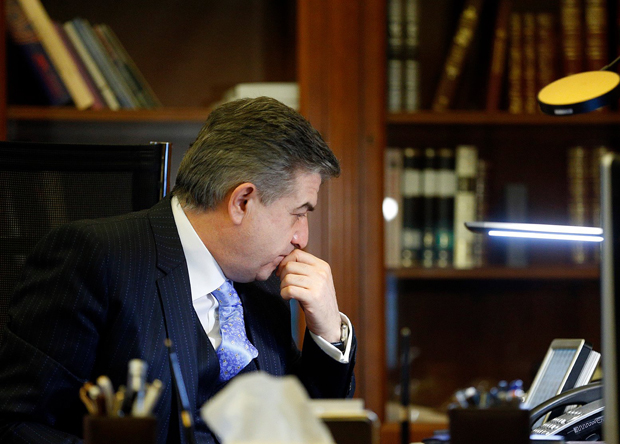 Karen Karapetyan
Karen KarapetyanPhoto: Tigran Mehrabyan
People often make do with something and lose themselves in the end.
I won’t make a discovery if I say that students are the most active part of any society. In USSR we, the YSU students, considered ourselves the most free-minded. Recently the students of the American University of Armenia asked me what advice I could give, and I had a simple answer for them: be independent, be free and love your country. In order to avoid accusations in excessive revolutionism (laughs-Mediamax) I’ll say this instead of “rebellious”: don’t tolerate things that are against your nature. People often make do with something and lose themselves in the end.
- Mr Prime Minister, what is unacceptable and intolerable to you?
- I don’t like and I don’t accept betrayal and lying.
- When you were offered to formulate the vision for Armenia’s future, you said: independent, safe, just and intellectual. Let’s discuss the correlation of these four points.
- They are closely connected, but obviously, we cannot have just and intellectual country without ensuring it is independent and safe. When I shared this formula, a friend of mine suggested I add one more word – rich. As a matter of fact, I think that if we manage the realize the first four points, Armenia will gradually become a prosperous country.
However, I attach the greatest importance to independence. Roughly said, if you are a servant to someone, what justice can you have?
- Opponents of the government claim that Armenia depends too much on Russia to be called a completely independent state.
-Of course, I do not agree with such statements. I am convinced that it is necessary to build clear and honest relations with Russia and other friendly states.
We have to take interests of big states into account and combine them in a way that our independence never becomes a disputable matter.
- Frankly speaking, I am very pleased that you not only read my latest column, but gave me the opportunity to discuss it with you. Nevertheless, there is a question I would like to clarify: do you view yourself as a politician?
- I will put it like this: I am gradually becoming. But I have never had the desire or ambition to become a politician. Moreover, had someone told me a year or two ago that I would become a politician, I would probably respond with a smile. I have never even dreamt of becoming Armenian Prime Minister. Although this is hard work, it also gives me, as a person with experience in management and Armenian citizen, the opportunity to serve my country. I wish that Armenia once becomes a country, which children of our compatriots and my own would never consider to leave.
- You are not involved in the RPA (Republican Party of Armenia) party list because of legislative restriction. What will your participation in the election campaign look like?
- I am the First Vice-President of RPA and I actively participated in the elaboration of the party's election program. And I intend to play a role in the campaign as well.
- Are you going to change or refresh RPA from inside?
- Not me, but the RPA has that goal. Every organization, be it a political party, state or private structure, needs to bring “new blood”, change and modernize to be able to come up differently.
- Some people were disappointed by your membership in RPA. How would you respond to them?
- I would advise them not to feel disappointed. I think It was a very predictable decision as Armenian President Serzh Sargsyan, who is also the President of RPA, offered me to take the position of Prime Minister.
No one can argue the fact that Prime Minister cannot work without having a political backing. What else could a Prime Minister, nominated by the President and the party, possibly do? Maybe start a new political party? In my view, there is no need for that.
- Speaking about the upcoming elections, you demanded at one of governement sessions to avoid “making a disservice”, implicating the use of administrative resources. Nevertheless, we hear every day that representatives of local authorities and condominiums visit people at their homes, trying to register them or find out who they are going to vote for. What should be done to communicate your message to those people?
- First of all, I would like to clarify what I was implicating by saying “disservice”. Our people do not like being under pressure, which can sometimes have a reverse effect. On the other hand, our society can not become perfect only in a day. When people blame RPA in all possible sins, they forget very often that this party represents all layers of our society. Figuratively speaking, if there is a bad and a good student in a family, should the family reject the bad one?
Our people do not like being under pressure, which can sometimes have a reverse effect.
Speaking more precisely about your question, we should voice every case of administrative resource use or violation. We should do it, unless our society starts to change. Even an ideal governance can not change in a day the work style by lower circles, formed for years and decades.
-You have mentioned for several times, that you would like to continue your activity as Armenian Prime Minister in 2018 , if you and your team succeed. Does it mean that the legislative restriction will not work in 2018?
- I think that I will meet that requirement in 2018.
- Do you have a formula to measure the effectiveness of your work?
- I would not be guided by numbers and indicators in this case, although they are important. If we have a relatively modest rate of economic growth and find at the same time the artery of economic development, having a clear understanding of where we are moving in every sector, that would be a satisfactory indicator for me.
- One more question on 2018: have you ever discussed with President Sargsyan his plans for the mentioned year?
- We have so many issues to discuss with President, that we have not managed to discuss that particular question.
- You remarked in an interview to Mir TV that if people are discontent with the elites, then the elites have to start changing. In my view, your activity as Armenian Prime Minister is a practical example of change in the elites. But can you actually pass that change “down”?
- The speed of passing “down”, as you put it, does not satisfy me, but this slow movement is not really concerning. Honestly, sometimes I expect faster changes than they are possible.
- Can your son or your daughter come up with advice or criticism, regarding your work?
- Sometimes they pose challenging questions, but I try to avoid speaking much about work at home.
When you are “loaded” with daily routine and papers all the time, you lose the ability to look into the future.
- Do you work on Sundays?
- I try to avoid working on Sundays, and this is not about lack of abilities or laziness. I consciously try to have at least one day off to preserve the ability of thinking “out of the box”. When you are “loaded” with daily routine and papers all the time, you lose the ability to look into the future.
- You said recently that you had become an “uninteresting” person and did not even manage to read books. Has that changed?
- No, unfortunately, it still goes on. Although I read something during New Year holidays.
- Would you name the recent books you read?
- I can name three books, which impressed me recently. The first one is “Just Get Out of the Way: How Government Can Help Business in Poor Countries” by Robert Anderson. The main idea of this book is that the government should not interfere in business.
The next one is “How Rich Countries Got Rich . . . and Why Poor Countries Stay Poor” by Erik Reinert. This author, on the contrary, implies that the government should have an active participation in many issues.
And the third one is “Returning to Capitalism in order to Escape Crises” by Pascal Salin, which clearly states that excessive involvement of the government can be dangerous.
The combination of these three books is an interesting symbiosis, which can form a new outlook. I advice these books for those interested.
- Years ago, when you were the CEO at ArmRosGazprom, we were flying on the same plane, and I noticed that you were reading Borges.
- I have always read a lot, but my choice of books has never been conditioned by the popularity of a given book.
- You like to pose questions and answer them yourself, while many think that it is a certain trick. Have you developed that style, or it just happens automatically?
- Frankly speaking, it is hard to say how exactly that style was developed. Together with using paper and pen during discussions, maybe it comes from my profession, applied mathematics.
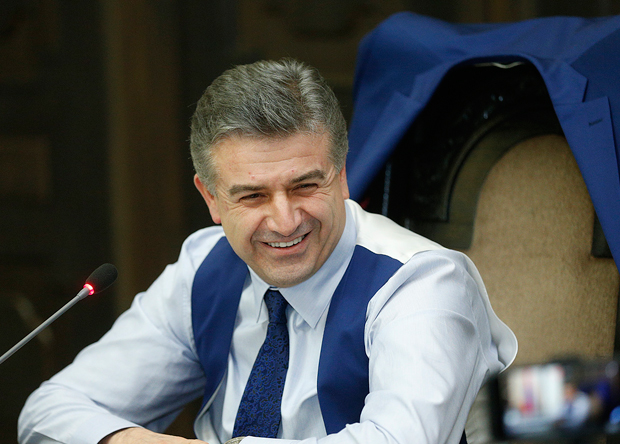 Karen Karapetyan
Karen KarapetyanPhoto: Tigran Mehrabyan
- And people also say that your laconic answers is a way of dodging questions.
-Do I really give laconic answers to your question today? (laughs-Mediamax).
- Some people complain about your vests and the habit of taking off your jacket at meetings.
- I just take it easy (smiles-Mediamax). It is not a trick at all, jacket may simply be uncomfortable during long meetings.
Ara Tadevosyan talked to Karen Karapetyan















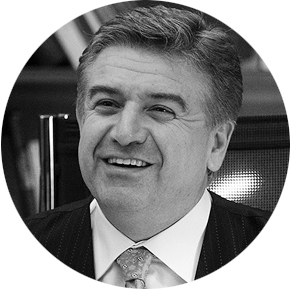

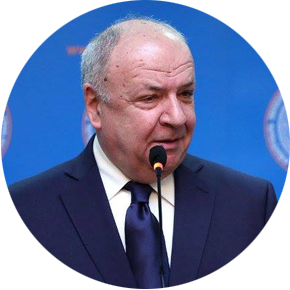









Comments
Dear visitors, You can place your opinion on the material using your Facebook account. Please, be polite and follow our simple rules: you are not allowed to make off - topic comments, place advertisements, use abusive and filthy language. The editorial staff reserves the right to moderate and delete comments in case of breach of the rules.